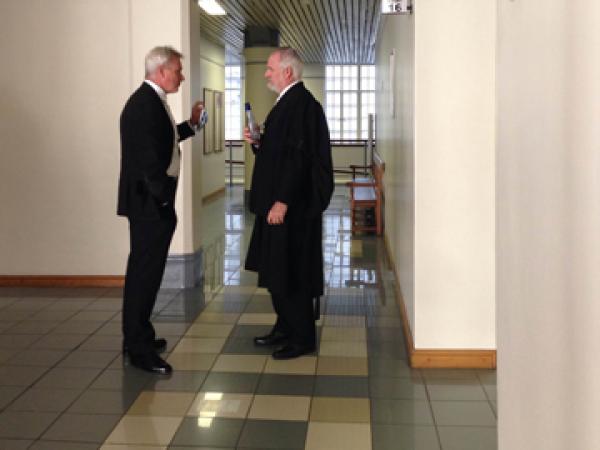Alibi on trial in Angy Peter case

State prosecutor Phistus Pelesa concluded his cross-examination of Angy Peter on 25 June at the Western Cape High Court drawing into question Peter’s alibi.
Peter, along with her husband Isaac Mbadu, is on trial for the kidnapping, assault, and murder of Rowan du Preez in October 2012. Du Preez died from burns after he was assaulted and necklaced. Azola Dayimani and Christopher Dina are also charged with the kidnapping and assault of Du Preez.
Pelesa asserted that the State’s evidence outweighs Peter’s alibi, and that he will later argue that her alibi did not withstand the State’s cross-examination. Peter maintains she was at home at the time of the alleged assault and murder.
“We will argue that when you had an opportunity to show you were at home, you failed to produce evidence on numerous occasions,” Pelesa said.
Pelesa asked Peter to defend her alibi in the light of hearsay evidence submitted by three police officers. The officers stated that when du Preez was found by police, he explained to them that Peter and her husband had kidnapped and necklaced him. Du Preez is said to have only explicitly named Peter, and none of the other three accused, Peter said 25 June.
This evidence was admitted only after a month-long “trial within a trial,” during which the defense argued Du Preez could not have uttered these words given his physical state after the necklacing. Judge Robert Henney ultimately ruled that Du Preez’s statements could be admitted as evidence.
Peter testified on the 25 June that it was unlikely that Du Preez himself uttered this statement because he would have explicitly mentioned Mbadu and Dayimani, as he knew them as well as he knew her. She believes that the police fabricated this statement to frame her.
The defense maintains that the police have framed Peter and her husband. Peter, an active member of the Social Justice Coalition, has actively spoken out against police corruption, and was the public face for the civil society lobby wanting the commission of inquiry into the South African Police Services in Khayelitsha.
On 24 June, Pelesa stated that the defense’s conspiracy argument will “in the end be something of a laughable matter.”
All three police officers testified that they did not know Peter before Du Preez was found. Peter stated on 25 June that she was “surprised” to hear they did not know her, given her extensive relationship with the police officers in Mfuleni and Khayelitsha.
Peter testified that she attended monthly meetings with cluster commanders to voice her concerns about police activity, attended meetings at the Mfuleni Police Station specifically, and had been a contact with police officers since before joining the SJC. Her involvement, coupled with the media attention due to the commission made her well known among most police officers, Peter said.
Pelesa clarified that while Peter expected police officers to know her, she had no hard evidence that demonstrated that these three officers knew her.
He further pressured her alibi with evidence of state witness Desiree Jack. Jack claims to have seen Peter and her husband returning to their home just after the police had found Du Preez. Peter claims that Jack is lying.
Peter also argued that it would have been difficult for Jack to see at that time of night, and that her home is gated, making it impossible for Jack to see anything in front of her home. During the cross-examination on 24 June, Pelesa maintained that the house is visible from Jack’s alleged vantage point. Peter stated that, although the house may have been visible, it would have been impossible to see any person inside.
Peter tried to discount Jack as a legitimate witness by stating that she had previously given contradictory reports to the court, showing a propensity to lie.
Pelesa also cited the evidence of state witness Asavela Ziki, who places Peter and her husband at the scene of the assault. Peter contested that Ziki has “proven to this court that she is a liar.”
“The manner in which I see it is different than you,” Peter said, in her defense. “I do not agree with what was said by the state witnesses. They are lying, they are liars.”
Isaac Mbadu took the stand 26 June, but court adjourned early due to the unavailability of interpreters. The court will take recess for the month of July. The matter has been postponed until 4 August.

This article is licensed under a Creative Commons Attribution-NoDerivatives 4.0 International License.


